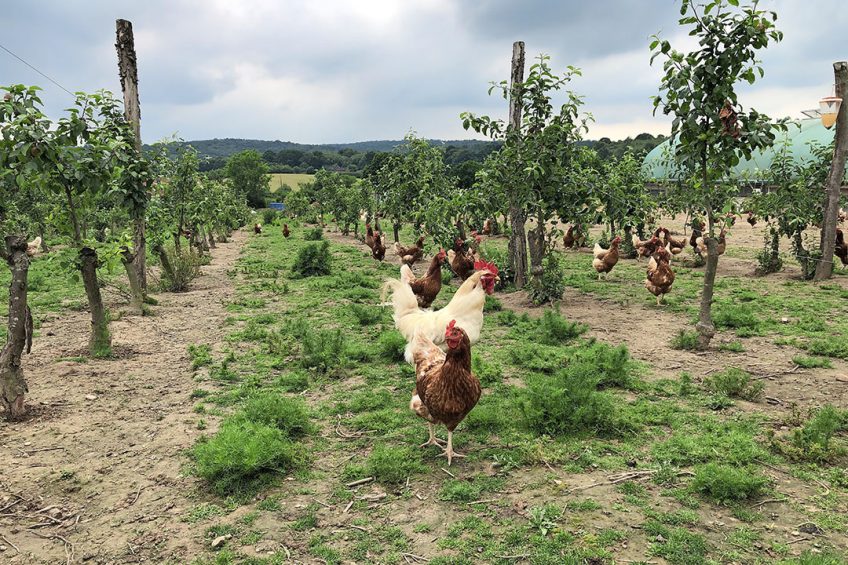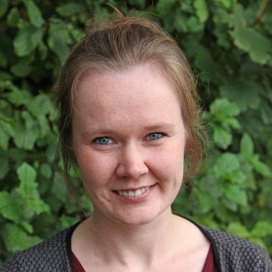UK layer farm selling each egg themselves

Daniël and Karen Hoeberichts take care of their egg sales themselves: a unique aspect of their biodynamic poultry farm, this however, it did not happen overnight.
Daniël and Karen Hoeberichts’ 5,000 hens both ensure their own income as well as that of one fulltime employee and 2 part-timers. The foundation of their company is selling their eggs themselves. That takes quite a lot of organisational skill. “I think it is nearly impossible to set up something like this at once. In our situation, it developed overtime,” says Daniël Hoeberichts.
|
The construction of their farm in Forest Row, a village situated a few dozen kilometres from London, started in 2006. Back then, they had one buyer. When they started with their first hen in 2008, they lost this buyer and had to find another way of selling their eggs. “We started to actively approach local companies,” Mr Hoeberichts explains. “This way, we slowly sold all our eggs. The first 2 years were expensive.”
“Our customers pay for service and quality,” he continues. “They praise the flavour of our eggs, which are always very fresh and find their way to our customers within 3 days.”
They have about 50 different regular buyers and never deliver only once. Their buyers are mostly active in the upper segment, such as delicatessens, luxury restaurants or local shops focussing on ‘conscious’ products, for example from animals kept with higher welfare standards. Because they have several smaller buyers, the Hoeberichts family also spread their own risk, for example when a buyer goes out of business.
Egg sales strategy
They work with 4 age groups on their farm, so they always have eggs available in different sizes. They keep the birds for 100 weeks. At the beginning of July, there are birds of 28, 51, 59 and 82 weeks. “We try to replace most hens during the summer, because we sell less eggs in these months,” Mr Hoeberichts explains. “Sales rise by 30% in autumn.”
Flexibility when demand fluctuates
They sell the eggs under their own label, Orchard Eggs. 80% of the eggs they sell come from their own farm and 20% come from organic farmers in the neighbourhood. In this way, the Hoeberichts’ maintain flexibility when demand fluctuates. These organic eggs are also sold under the Orchard Eggs label, with the proper indication.
We try to replace most hens during the summer, because we sell less eggs in these months,” Mr Hoeberichts explains.
Sorting eggs by size
All eggs are sorted and packaged at the Hoeberichts’ farm. They sell each egg themselves, no matter the size. A carton of 6 costs about € 2.15, a tray of 30 is € 8.50. 80% of the eggs leave the farm in ‘mixed-size’ packaging, which means that cartons contain eggs of various sizes. 20% is sorted by size. In the beginning, they sorted everything by size, but they soon found out that that did not work.
For customers mixed sizes works
At first, it was difficult to convince some customers to change to mixed-sizes, but a reduction persuaded them. Buyers find the different sizes favourable in practise as well: they only need to buy one product. “We sometimes still have a customer that wants a complete pallet in size L,” says Mr Hoeberichts. “We then need to explain that that cannot be done.”
We sometimes sold too many eggs, which resulted in another drive the next day, because the eggs were simply not produced the day before.” – Daniël Hoeberichts
Pullet eggs
The Hoeberichts family value explaining things well to their buyers and consumers. They ingeniously market the hens’ first, smaller eggs as ‘pullet eggs’, in cartons of 18 pieces. A pullet is a young hen. “We make it into something special by indicating that these are the first eggs of our young hens, that put a lot of energy in laying them,” he explains. “We only sell them a few times a year. Since we started doing this, we can sell all these eggs ourselves.”
They also supply eggs to several bakeries that can buy what the farmers want to sell at a given moment. Second-quality eggs are sold directly to consumers at the farm.
Close to customers
Daniël and Karen Hoeberichts experienced the advantage of direct contact with their customers for the first time 3 years ago. England was rocked by avian flu and their hens had to be kept indoors. Production decreased significantly. They decided to devaluate their eggs from biodynamic to organic. Meanwhile, their costs only increased because of the decline in production. Mr Hoeberichts still appreciates how that turned out. “We put a note with our picture on it in with the egg cartons. We explained our situation and that we had no other choice but to devaluate our eggs and to increase their price. We wrote that we needed our customers now more than ever. The effect was amazing: sales went up. It showed us that customers appreciate honesty and a personal story.”

Behind their sales is a fixed weekly planning. They deliver eggs 3 times a week: locally one day, one day in London and a route through various coastal towns on the third day. The longest one is about 150 kilometres.
The Hoeberichts make their planning together, which according to Daniël Hoeberichts, has gone without a glitch for the past 2 years. “We sometimes sold too many eggs, which resulted in another drive the next day, because the eggs were simply not produced the day before. That took a lot of time. Right now, we have the numbers of previous years so we can estimate more precisely how much our buyers need.”
Biodynamic agricultureBiodynamics was the first modern organic agriculture. Its development began in 1924 with a series of eight lectures on agriculture given by philosopher Rudolf Steiner. These lectures, the first known presentation of organic agriculture, were held in response to requests by farmers who noticed degraded soil conditions and a deterioration in the health and quality of crops and livestock resulting from the use of chemical fertilisers. Biodynamic agriculture is a form of alternative agriculture very similar to organic farming, but it includes various esoteric concepts drawn from the ideas of Mr Steiner. Biodynamics includes a spiritual, mystical, and astrological orientation within agriculture. Important features include the use of livestock manures to sustain plant growth, maintenance and improvement of soil quality, and the health and wellbeing of crops and animals. On top of that, biodynamic farms often have a cultural component and encourage local community, both through developing local sales and through on-farm community building activities. There are certification agencies for biodynamic products, most of which are members of the international biodynamics standards group Demeter International. |


 Profile
Profile












